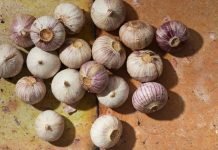
In a new study from the University of Iowa, researchers found that metabolism of plant-based dietary substances by specific gut bacteria, which are lacking in patients with multiple sclerosis (MS), may provide protection against the disease.
They found that a diet rich in isoflavone, a plant-based compound that resembles estrogen, may protect against multiple sclerosis-like symptoms.
Importantly, the isoflavone diet was only protective when the gut microbes are capable of breaking down the isoflavones.
Previous human studies have demonstrated that patients with multiple sclerosis lack these bacteria compared to individuals without MS.
This study provides evidence that the combination of dietary isoflavones and these isoflavone metabolizing gut bacteria may serve as a potential treatment for MS.
Isoflavones are found in soybeans, peanuts, chickpeas and other legumes.
The study also found that mice fed the isoflavone diet have a microbiome that is similar to the microbiome found in healthy people and includes the bacteria which can metabolize isoflavones.
Conversely, a diet lacking isoflavones promotes a microbiome in mice which is similar to one observed in patients with MS and lacks beneficial bacteria that can metabolize isoflavone.
Multiple sclerosis is an autoimmune disease of the brain and spinal cord where the immune system attacks the protective coating surrounding nerve fibers.
The symptoms of this disease include muscles weakness, balance issues, and problems with vision and thinking. While there are treatments that slow down the disease, there is currently no cure for MS.
Although the exact cause of MS is unknown, a complex interaction between genetic and environmental factors are thought to initiate the disease.
Recently, the gut microbiome—the trillions of gut bacteria the live inside human intestines—has emerged as a potential environmental factor that contributes to MS.
In prior work, the team demonstrated that there are big differences between the gut microbes of patients with MS and people without MS. Specifically, patients with MS lacked bacteria that are able to metabolize isoflavones.
If you care about gut health and nutrition, please read studies about a gut feeling may be key to early detection of colon cancer and findings of this gut problem may be linked to restless legs syndrome.
For more information about gut and your health, please see recent studies about gut bacteria linked to chronic pain and results showing that these four ancient herbs may benefit your gut and metabolism.
The study is published in Science Advances. One author of the study is Ashutosh Mangalam, Ph.D.
Copyright © 2021 Knowridge Science Report. All rights reserved.




